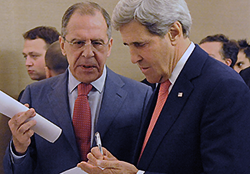Jon B. Wolfsthal
December 6, 2013

John Kerry and Sergey Lavrov after concluding the Iranian nuclear deal, Wikimedia Commons
The Iranian Nuclear Deal
Iran’s pursuit of nuclear weapons presents the greatest strategic security challenge to the United States in the Middle East. Seeking a diplomatic resolution to the nuclear issue with Iran, and opening the door to other possible areas of engagement, has been one of the defining goals of the Obama Administration since it took office. The Geneva agreement reached with Iran, the United States and major European powers on November 24th marks the first reach success in that strategy.
The interim agreement will effectively freeze Iran’s nuclear material production for six months. In exchange, Iran will receive minor relief from sanctions on the order of $6-7 billion dollars, a step easily reversed should Iran fail to comply with the short-term deal. Most nuclear experts agree the terms of the deal will increase, albeit modestly, the amount of time it would take Iran to produce enough nuclear material for a nuclear weapon as much of their material has to be diluted or turned into oxide, less easily re-enriched. At the same time, Iran will provide the International Atomic Energy Agency daily access to key facilities, including some not previously available to international observers.
Criticism of the deal from some groups and former officials have been focused on the fact that the interim deal does not completely eliminate Iran’s enrichment capability and on what some argue is U.S. endorsement or recognition of Iran’s “right” to enrich. While the Administration, most notably Secretary of State John Kerry has said that the agreement does not codify Iran’s right to anything, the interim agreement does enable Iran to continue, in a restricted form, some of its enrichment activities.
Judging the interim deal depends in large part on whether one is prepared to accept a deal with the Iranian regime. For some former officials, doing business with Tehran, even one run by President Rouhani, is an unacceptable risk. Others, including the President agree that skepticism is appropriate but are prepared to see if a negotiated deal can serve US security interests and those of its allies in the region, including Israel. Sanctions and diplomatic pressure, as the President reminded the American people after the Geneva accord was reached on November 24th, were designed to convince Iran to negotiate and were not designed to be and end in themselves or to force the regime from power.
To be sure, the interim agreement does not address all outstanding US concerns. Iran continues to have a significant nuclear breakout capability and has yet to explain many past activities linked to a military nuclear program. But the interim agreement, and parallel steps with the International Atomic Energy Agency, provides the best opportunity in a decade to resolve past disputes and restrict Iran’s nuclear weapons potential.
The process of negotiating a comprehensive final agreement will be complicated, and it would not be surprising if the sides decided to extend the interim six month agreement for some time if real progress is being made. Such a step is in the world’s security interest, but it may be challenging for Iran’s leaders to accept an indefinite extension. The nuclear suspension in 2003, also agreed to by President Rouhani when he was the lead nuclear negotiator, was eventually seen as a bad deal inside Iran and the reversal of that freeze is what led, in part, to the more vibrant and expansive nuclear program Iran is now pursuing.
In sum, the interim agreement is a good, if imperfect deal and admittedly was not designed to resolve the entire Iranian nuclear challenge. But it is a solid, well crafted and defensible deal. The President has created some breathing room for a larger deal to be tested. Now the hard work of crafting such a final agreement begins.
